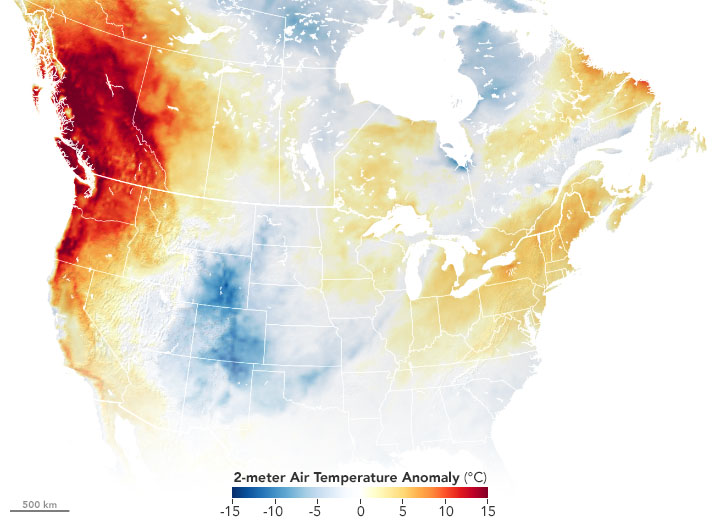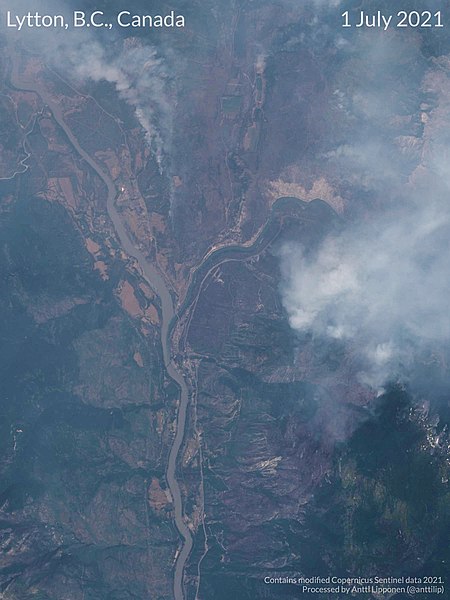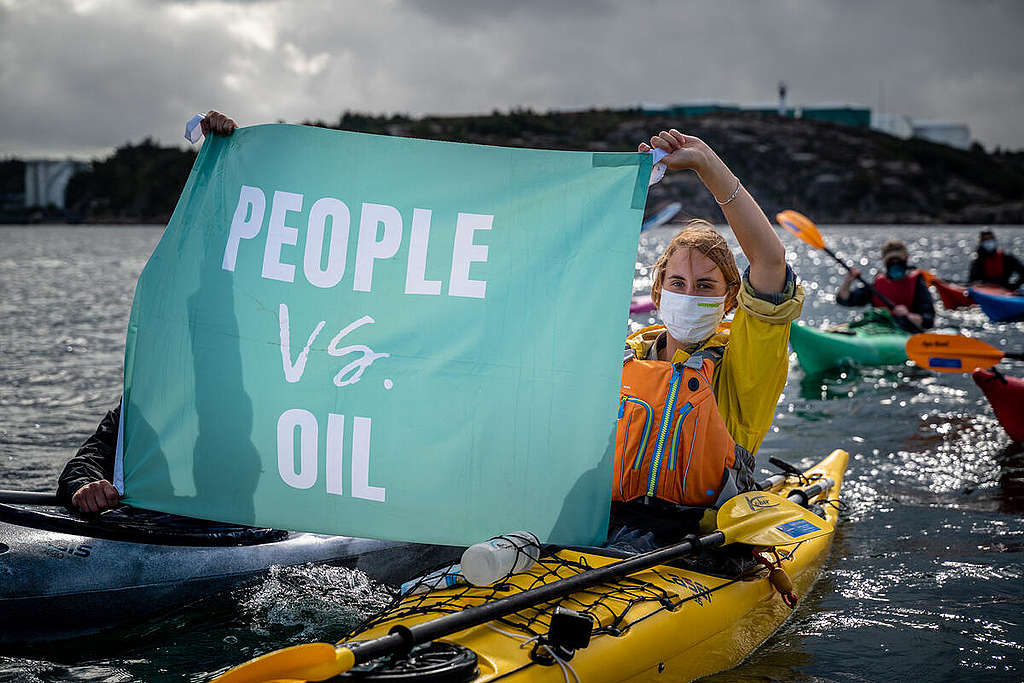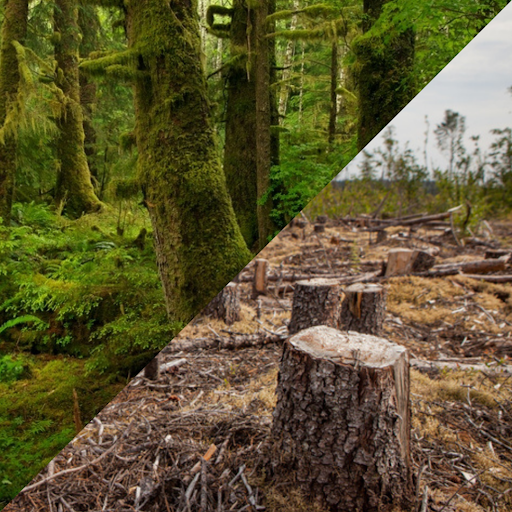You’ve probably seen the shocking and disturbing news. BC experienced a brutal heatwave which brought record-breaking high temperatures of nearly 50˚C. Hundreds of people died. More than a billion seashore animals may have been cooked to death. The extreme heat and resulting dry conditions fed raging wildfires which devastated whole communities. Lytton, BC was burned to the ground.

Did climate change play a role in this devastating disaster?
Often it can be difficult to know how much extreme weather is due to climate change. In this case though, we have a clear answer: yes, this was a climate disaster.
A recent study from an international group of scientists found the heatwave could not have happened without climate change. They found climate change made this event 150 times more likely. This heatwave was caused by climate change.
This study adds to an extremely important and rapidly growing body of scientific research called ‘attribution science’ that is finding clear contributions of climate change to extreme weather events.
Other attribution studies have also concluded climate change contributed to major extreme weather events in Canada. One study of BC’s record-breaking 2017 wildfires found the fires were made 7-11 times larger because of climate change. Another study of heat extremes in the summer of 2018, which included a heatwave in Quebec estimated to have killed up to 70 people, found climate change played a central role. A 2017 study concluded the massive 2016 Fort McMurray wildfires, one of the most expensive disasters in Canadian history, costing over $3.5 billion in damages, were made 1.5-6 times more likely because of climate change.
Attribution science has not only studied extreme weather events in Canada but also all around the world, and hundreds of these studies have found climate change was responsible for specific extreme weather events.

But who’s responsible for climate change?
The fossil fuel industry is overwhelmingly responsible. Their products are causing climate change and they are fighting tooth and nail to block policies that would end the burning of fossil fuels, reduce emissions and stop the planet from getting even hotter. They have been doing this for decades, and they are still doing it now.
The fossil fuel industry successfully lobbies governments not only to block climate policies, but also to shower them with billions in public subsidies and supports. A recent report found oil and gas pipelines received over $23 billion in support from provincial and federal governments in Canada over the past three years. Another report found BC’s NDP government doubled fossil fuel subsidies over the past two years to $1 billion.
However even these massive public subsidies are dwarfed by the money the fossil fuel industry gets from the Big Banks—TD, RBC, BMO, CIBC, and Scotiabank—who collectively have provided over $600 billion in financing for fossil fuels since 2016.
These climate disasters will keep happening and will keep getting worse until we confront the fossil fuel industry and successfully break the stranglehold they have over our politics and our society. Only then will the fossil fuel burning stop and the planet stop getting ever hotter.

How can we stop climate disasters?
There’s no single action you can take as an individual which will completely fix this. The fossil fuel industry is too powerful for that. This will take all of us working together to get it done. But the good news is we CAN do it.
Here are some steps to get started:
- Support impacted communities. Already First Nations impacted in BC are saying they are being excluded from recovery plans. Be sure to support communities impacted by these climate disasters, and support community resilience for the disasters which are still to come.
- Join the movement and sign our petition calling on the Big Banks—TD, RBC, BMO, CIBC, and Scotiabank —to stop pouring financial fuel on the climate fire.
- Become a climate activist: ok this one is cheating a bit, because it’s not one action, it’s a bunch of actions bundled up in a lifestyle. But becoming a climate activist is the most important lifestyle choice you can make to stop the climate crisis. Every week, take a political action for climate: share an article, call your MP, volunteer for an environmental organization. The more you do it, the easier it will get, and the bigger impact you’ll have.
The bad news is more disasters like this will happen because the climate crisis is only just beginning. But the good news is we can stop the climate crisis because together we are more powerful than the fossil fuel industry. We can stop them, together.

One of Canada’s natural treasures could disappear in 5 to 10 years if we don’t act now. Tell B.C.’s Premier John Horgan to keep his promises and protect old-growth forests immediately.

Discussion
Global warming is largely due to the consumption of fossil fuels, but now we have achieved a great deal in this critical situation, which is very promising. We now have a new invention for producing clean energy. The purpose of this invention is to produce clean and cheap energy, which is obtained by finding the correct answer to a complex scientific question. This invention clearly proves that I was able to achieve this answer. In disbelief, for more than one hundred and fifty years, all the scientists of the world have been searching for this scientific answer and have not succeeded. The world's most prominent physicists, including Albert Einstein, were not interested in finding this scientific answer because they knew they did not have the scientific ability! I found this scientific answer in 2013 and fortunately it has been finally approved by the University of Iraqi Kurdistan. Now, according to the legal documents of the German Patent Office, fortunately, a permit has been issued for the construction of this new clean energy power plant model. This means that German companies have a license to build this new power plant. The power plant that will be built for the first time in the world and has no similar example in the world. This invention is in fact a gift to the Green Peace and the UN General Assembly, taking into account all its political, economic and cultural rights, which are reserved for me as its inventor. Undoubtedly, from this date onwards, the world energy problem will be solved and all the economic, political and cultural infrastructures of the world will change, and soon all the countries of the world will adapt to this advanced and clean technology. Fortunately, I now have a simple example of this power plant and I am able to show it to scientists. This clean energy power plant includes a new deep water power plant method for dams and seas that works based on a physical formula. In other words, we produce clean energy at the zero point of the opposing forces, and we will make the most of the natural properties of air and deep water. The cost of construction and operation of this first new clean energy power plant is very low, which will be determined after the construction of industrial animation. The purpose of making industrial animation is to operate this power plant with all the information and scientific principles of air and water in the computer and to prove the correctness of finding a scientific answer to a complex global hydroelectric question. Finally, the cost of construction and operation of this power plant will be determined and announced by the Hydroelectric and Clean Energy Laboratory. Because many of the plant's equipment will be built for the first time in the world, which will be determined by the amount of clean energy production capacity and by the amount of flow capacity and power of deep-water turbines. An amount of less than twenty million euros can be considered, which is a very small amount for such a global strategic achievement. The scientific sources that can be cited include all the known laws of physics and the global environment, because all the data are based on this and its correctness has been confirmed by the University of Iraqi Kurdistan. It has also been officially published on all websites and newspapers in Iraqi Kurdistan since 2013 and is now visible. The only question that should be raised as a final issue is whether the scientists of the world and green peace, as well as politicians and journalists, have prepared themselves for a global shock. And how will they react when they know that all countries have so far wasted half of their global economic budgets and capital, and what harm has been done to the global environment? Yes, the subject of catastrophes that could easily have prevented them from happening. What is the complex global scientific question in hydroelectric knowledge? How can we obtaining clean energy in a best way from the potential of water static head in dams and seas that is very different from with the past methods? Answer: This is by getting benefit of joint scientific formula (E>P+1at) with immersion turbines method inside the water of dams and seas (Immersion turbines of series and parallel in zero point of opposite forces). (Ee>Ep+E1at) = (E>P+1at) Ee= High pressure clean energy that is produced by the water power plants in the depth of water via released fixed potential energy of water natural pressure (More than ten meters of water) with new method (Immersion turbines of series and parallel in zero point of opposite forces). (Ee = Strong clean energy generated in the system)! Ep= Released fixed potential energy of water natural pressure in water depth (More than ten meters of water). E1at= Amount of energy that is consumed at a small pump of one atmosphere power is the ability (In the same place of the water power plant in water depth).